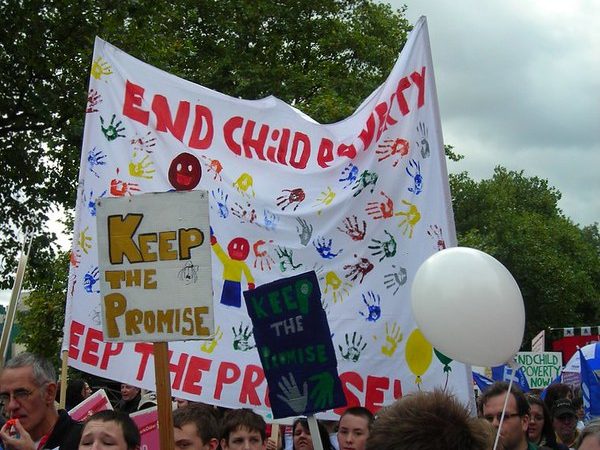Over the last decade the number of children living in poverty has increased by around 600,000.

Children are the future of any country and the way they are treated says a lot about its values.
In a comparatively rich country like the UK, too many are condemned to poverty, disabling their physical and intellectual development. This is aided by government policies based on defunct theories.
In 2021/22 some 14.4 million people, including 4.2 million children (29% of children), were living in poverty and struggling to make ends meet. To some extent poverty is relieved by social security benefits. In April 2023, some 5.9 million people received social security benefits in the form of Universal Credit. Due to wage freezes and austerity the average real wage is lower than what it was in 2005, and more people are pushed on to universal credit. 38% of the people on universal credit were in employment in March 2023. Half of households on universal credit payment had children.
Over the last decade the number of children living in poverty has increased by around 600,000. Last year alone, some 350,000 more children were pushed into poverty because government portrays the poor as scroungers.
Those on the right of the political spectrum have long demanded that the poor should have fewer children, and that rather than relying upon benefits parents need to work extra hours, assuming that well-paid jobs and affordable childcare can be found. In response, the Conservative government introduced a two-child cap on universal credit. This policy prevents parents from claiming universal credit or child tax credit for any third or subsequent child born after 2017. Therefore the number of children living in poverty increases each year.
Depending upon circumstances, the amount of universal credit for a post-2017 child can vary from £270 to £457 a month. The loss of the universal credit for the third and subsequent child affects 1.5 million children (of which 1.1 million are in poverty) in 400,000 families and their income is reduced by around £3,000 a year. The reduction in household income has consequences for the whole family. These include food insecurity, inability to pay for energy, rents, mortgages, clothing, transport, education and essential bills, and families are forced to take on more debt. Parents struggle to afford a wide variety of essential items for their children, which have knock-on effects on the children’s emotional and physical development. The loss of income prevents children from participating in extracurricular and leisure activities, and cultural and family celebrations, and makes them feel isolated. Last year 1.4 million children and young people sought help for mental health problems. Cases of malnutrition, scurvy and rickets are increasing. British five-year-olds are up to 7cm shorter than children of the same age in Europe, and lack of nutritious food is considered to be a major reason.
Abolition of the two-child cap would cost around £1.3bn a year and lift 250,000 children out of poverty and lift another 850,000 out of deep poverty. The cost of not doing so results in lower wages, pensions, educations, skills, GDP; greater demands on healthcare, public services and social security systems, which is estimated to have an annual cost of £39.5bn a year . On any basis of cost-benefit analysis, the cap should be abolished.
The government punishment of children and the poor is based on ideology rather than any economic necessity. Previously, leadership of the Labour Party, the main opposition party said: “The obscene and inhumane two child cap must go”. In June 2023, the shadow Work and Pensions Secretary hinted that Labour will scrap the “heinous” two-child benefit cap. Now its leader has said that upon taking office, the party will not abolish the cap as it fears negative media comments on state spending commitments. Fiscal responsibility is the new mantra i.e. the next Labour government will not borrow to fund spending. Seemingly, children’s life chances are to be sacrificed to appease right-wing ideologies.
There is no shortage of resources. Governments have bailed out banks and will magically find more resources to bailout the next collapsed corporation. They have handed nearly £1 trillion of quantitative easing to speculators. Vast amounts of subsidies are handed to corporations. For example, last year train companies received £13.3bn in subsidies. For the year 2023-24, the government is likely to spend £1,189bn. It is not beyond the wit of any government to find £1.3bn or more from existing resources.
Due to the freeze on tax free personal allowance, income tax and national insurance thresholds, the government has collected extra £40bn of tax revenues in 2022-23. Since 2010, between £450bn and £1,500bn of tax has not been collected due to evasion, avoidance, abuse and error, and there is always a possibility of tweaking the tax system for additional revenues. But the political will is not there. The governments are more likely to hand tax cuts to the rich than address child poverty.
Political parties have declared war on the poor and children. They nakedly compete to see who can be the harshest. One must ask: what kind of a society condemns children to unfulfilling lives in the name of ideology and self-imposed fiscal rules.
Left Foot Forward doesn't have the backing of big business or billionaires. We rely on the kind and generous support of ordinary people like you.
You can support hard-hitting journalism that holds the right to account, provides a forum for debate among progressives, and covers the stories the rest of the media ignore. Donate today.



